Bynames and family names tell us a lot about the historical geography of the Cornish language. But first what’s the context? When did bynames, changing from one generation to the next, become stable surnames, passed down from generation to generation. In England there was a long transitional phase, from around 1250 to the 1400s, during which second names became fixed. This occurred first in the south east and in the wealthier sections of society and then spread later to the north and to the poor.
In the Cornish lay subsidy roll of 1327, 94% of those taxpayers who bore local placenames as their second names were living in the parish where that place was found. This strongly suggests that, even among the landowning class, in 1327 in Cornwall fixed surnames were rare. By the time the next relatively comprehensive list of names is available – in the early 1500s – virtually all families in England possessed hereditary surnames.
But not in Cornwall. In the 16th century second names in Cornwall could still be fluid, liable to change from father to son (and daughter). Charles Henderson discovered the example of the Thomas family at Carnsew, Mabe, who in the 1580s decided to call themselves Carnsew. A century later they’d moved to the neighbouring parish of Budock and the alias of Carnsew had become their family name. This practice of adopting new surnames when moving house was apparently not uncommon. From the Arundell estate papers, Oliver Padel cites the example of Walter John Jago in 1480, whose family name had became Trethowall by 1499. As late as the 1570s Pascow Kerne at Newlyn East changed his name to Pascoe Tresylyan. For Padel, this illustrates a ‘fondness for having as a surname the name of one’s residence’. Maybe, although we must also note that the proportion of families bearing such local names as their surnames in Cornwall was not exceptionally high, lower than in Yorkshire and Lancashire for instance.
Although some families had hereditary surnames by the later 1400s, in the 16th century many others still hadn’t. The reason why in Cornwall bynames did not become hereditary for many families until the 16th century was that Cornwall was a land of two tongues. In Wales in the 15th century Bruce Lenman notes a convoluted ethnic frontier, and significantly adds, ‘not to mention a lesser one of the same kind in Cornwall where a Celtic tongue was still widely spoken’.
It’s precisely because of the existence of two vernaculars that naming customs in parts of Cornwall differed from those in England. In Devon, it’s been estimated that hereditary surnames were the norm by 1350; in Wales this wasn’t the case until the 1600s. However, in Cornwall, both English and Welsh naming practices could be found. In the east of Cornwall there is little reason to assume that hereditary surnames were uncommon by 1400. Indeed, in Werrington, on the border, most families had hereditary surnames by the 1360s. But in the west, reflecting that ethnic frontier, an unknown percentage of second names were still unstable well into the 16th century and perhaps later, this proportion probably highest among the poorest.
If this was the case we might expect many people’s second names in the west in the early 16th century to have meant what they said. If someone was called Miller, they were a miller; if their name was White, they would have had a pale face or light coloured hair. And in parishes where Cornish was spoken their names may actually have been Melender or Angwin, miller and white in Cornish. Sometimes, not always, these names would have been written into the record in their original Cornish form.
Sure enough, in the 16th century lay subsidies we find a number of specifically Cornish names. Some were distinctive patronymics. Higow, Doggow, Daddow, Clemow and Sandow were the equivalent of Hicks, Dodge, Davies, Clements and Sanders, the suffix -ow indicating son of. Sometimes the suffix -a is found, as in Holla (son of Hal/Henry?), Matta, Tomma or Jacka, these names significantly being restricted to the west. Although the latter two at least could also be found in earlier centuries in English-speaking Devon and may either indicate a conservatism in naming practices or a tendency to add -a to borrowed English words.
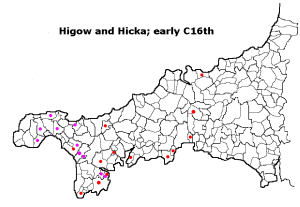 As an example, the distribution of Higow or Hicka, the Cornish for Richard, in the early 16th century shows a definite western emphasis. By 1641 however, instead of ramifying as most names did, the number of Higows had declined. Higgo could still be found, mainly in Helston and Gwennap, in the 18th century but by the 19th century it had disappeared. Some Higgoes may have become Hugo, and others would have transformed their names into the English Hicks. While Higow (and Doggow) became extinct, others such as Jacka or Gummow survived to become hereditary surnames.
As an example, the distribution of Higow or Hicka, the Cornish for Richard, in the early 16th century shows a definite western emphasis. By 1641 however, instead of ramifying as most names did, the number of Higows had declined. Higgo could still be found, mainly in Helston and Gwennap, in the 18th century but by the 19th century it had disappeared. Some Higgoes may have become Hugo, and others would have transformed their names into the English Hicks. While Higow (and Doggow) became extinct, others such as Jacka or Gummow survived to become hereditary surnames.
A better guide to identifying where the Cornish language was spoken in the early 1500s may be provided by nicknames. In fact a rich set of Cornish nicknames circulated at this time.
Some Cornish nicknames in the 1500s
| Abas (Abbot) | Envelyn (yellow) | Mana (Monk) |
| Anglasse (Green) | Enwore (Gold) | Marrack (Knight) |
| Angwin (White) | Epscop (Bishop) | Melonek (yellowish) |
| Anhere (Long) | Ergudyn (snowlock) | Scovarn (ear) |
| Coynt (strange) | Gotha (elder/senior) | Sise (English) |
| Cunnack (Wise) | Gothewer (evening) | Taborer (drummer) |
| Duwyn (Grey?) | Gwaryack (playful) | Tegaw (Toy) |
| Endean (Mann) | Hegar (friendly) | Tege (beautiful) |
| Endeves (Mutton) | Kembra (Welsh) | Vean (junior) |
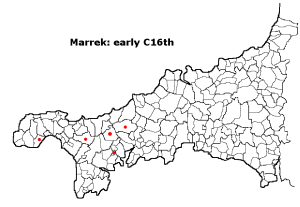 Most of these were only borne by a handful of families and did not become hereditary, and have therefore unfortunately been lost. A few, like Marrack, survived. Some doubts have been expressed about the Cornish origins of this name. However, its distribution in 1861 suggests a West Penwith focus, while in the 16th century we can see that it was more widely encountered but only west of Truro. Overall, nicknames were in general in the early 16th century more likely to be found in Penwith and Kerrier, with some finding their way into east Cornwall.
Most of these were only borne by a handful of families and did not become hereditary, and have therefore unfortunately been lost. A few, like Marrack, survived. Some doubts have been expressed about the Cornish origins of this name. However, its distribution in 1861 suggests a West Penwith focus, while in the 16th century we can see that it was more widely encountered but only west of Truro. Overall, nicknames were in general in the early 16th century more likely to be found in Penwith and Kerrier, with some finding their way into east Cornwall.
Occupational names are an even better guide to the geography of the Cornish language at this time. Of the following occupational names only Angove (the most common) and Trehar (Trahair) survived to become hereditary surnames. That reinforces the conclusion that such bynames in the early 16th century meant what they said and were not yet hereditary surnames. No doubt, as the transition to fixed surnames was made in parallel with the spread of English, names like Trehar would tend to be translated into their English equivalents.
Some Cornish occupational names in the 1500s
| Angoffe (Smith) | Mablean (Clark) | Trehar (Tailor) |
| Dreveler (Mason) | Melender (Miller) | Trockyer (Fuller) |
| Gweader (Weaver) | Meneger (Glover) | Tyar (Thatcher) |
| Kegoer (Butcher) | Pebar (Baker) |
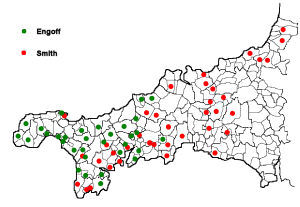 The distribution of Engoff/Angoff and Smith in the early 16th century might suggest where Cornish was likely to be the language of choice. Note however that Smith was hardly unknown in mid and west Cornwall. To some extent, this is to be expected, as those who wrote down the record would have been literate in English and only rarely in Cornish and may have, wittingly or unwittingly, translated the spoken Cornish Engoff into its higher status English version when writing it down. Given the inferior status of Cornish it’s hardly surprising that English occupational names were also widely found in Cornish-speaking areas. This does not necessarily mean that their bearers were English-speakers however.
The distribution of Engoff/Angoff and Smith in the early 16th century might suggest where Cornish was likely to be the language of choice. Note however that Smith was hardly unknown in mid and west Cornwall. To some extent, this is to be expected, as those who wrote down the record would have been literate in English and only rarely in Cornish and may have, wittingly or unwittingly, translated the spoken Cornish Engoff into its higher status English version when writing it down. Given the inferior status of Cornish it’s hardly surprising that English occupational names were also widely found in Cornish-speaking areas. This does not necessarily mean that their bearers were English-speakers however.
If we combine together all Cornish language names of all types we get this map.
This suggests the Cornish language was spoken up to Rumford, the area west of Bodmin and Tywardreath, with an ambiguous zone between the Camel and the Fowey. The division reflects a long-lasting linguistic frontier which was in place probably from the early 14th century to the 17th century and which moulded the history of Cornwall, even leaving its traces in the modern cultural landscape.
This conclusion is supported by other evidence. Oliver Padel has noted the presence of two-part surnames. Someone called Richard John Tomkin for instance might have a son, who would then be called Uryn Richard John, an echo of Welsh naming practices. Sometimes the final part of the name was a placename, as in the case of Jenkin Tom Hellas (Helston), who lived at Penryn in 1543. If two-part surnames in the early 1500s are mapped, we see something very similar to the map of Cornish language names.
As bynames became surnames relatively late in the west, there was a tendency for a high proportion to be patronymic. This explains the frequency of patronymic surnames in Cornwall, as in Wales. Indeed, a map of the three most common Cornish surnames in 1861 – Williams, Thomas and Richards – can be viewed as a ghost of the geography of Cornish in the 1500s and 1600s. (The relatively high proportion in the Liskeard and Calstock districts was the result of the migration of miners eastwards.) As Robert Morton Nance put it ‘Cornish [locative] surnames may record only the loot, by a Norman, of the estate of a Saxon, who dispossessed the heir of a Cornishman, who founded it and gave it his own name with Tre- before it; while the Cornish founder’s heirs may still walk among us bearing perhaps, like so many Celts in Wales, some name such as Williams, Thomas or Richards.’
Cornish language locative surnames are therefore not a good guide to the geography of the Cornish language. This is because placenames were formed many centuries before surnames became hereditary and are as likely to be Cornish in the east as in the west (with the exception of the far north beyond the River Ottery and stretches along the Tamar downstream). Indeed, Oliver Padel has found that in 1327 there was little difference in the proportion of locative surnames between the west and east of Cornwall. Yet that had changed radically by the early 16th century. In the 1500s the Cornish-speaking west had a considerably higher number of locative surnames than did the east. Moreover, the transition was not gradual but exhibited a sudden, sharp discontinuity in mid-Cornwall. This discontinuity came precisely at that line running from the Camel southwards through St Wenn and Luxulyan to St Blazey. Clearly this has to be evidence for different naming practices in east and west, reflecting cultural divisions within Cornwall in the 1500s.
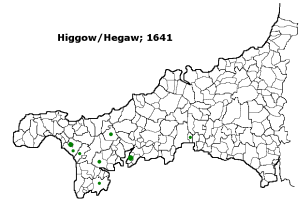
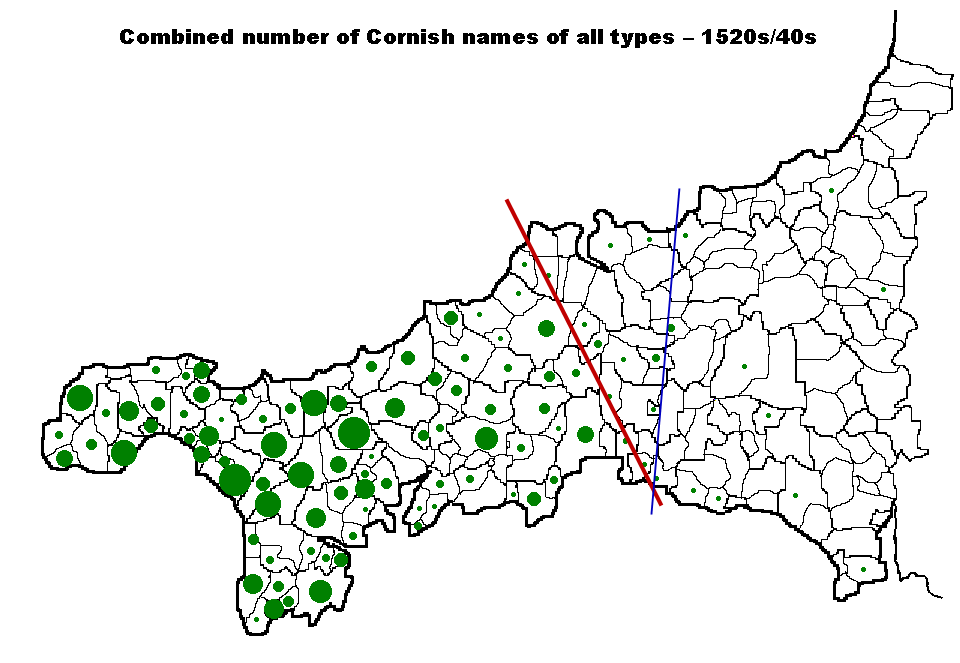
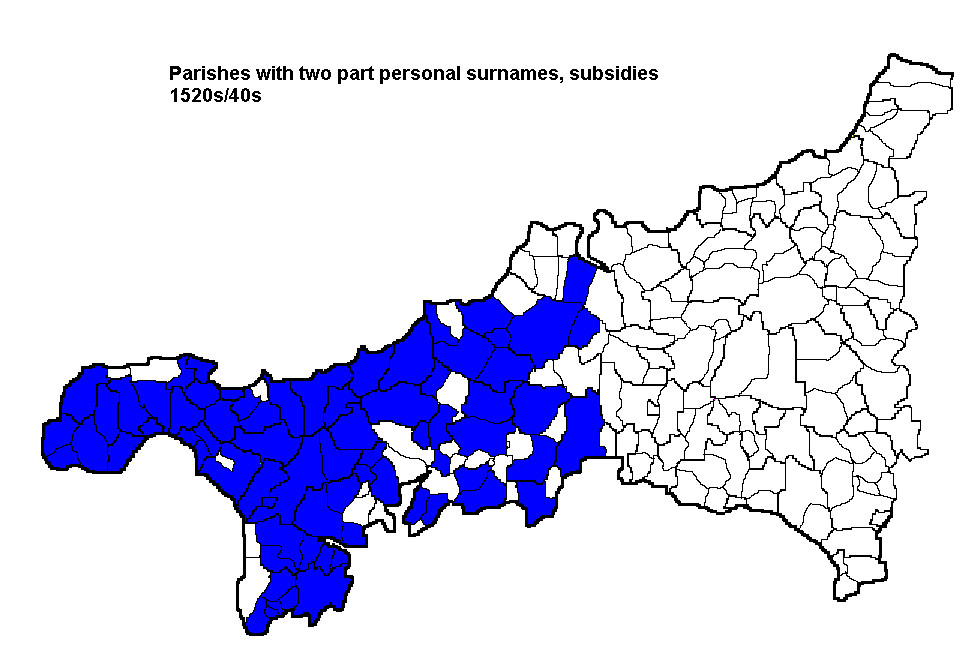
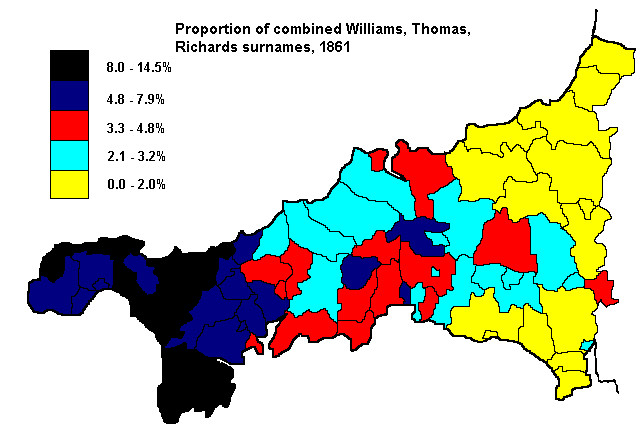
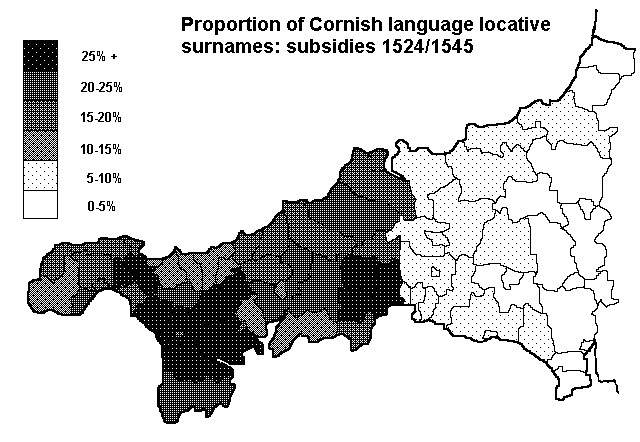
My ancestors in the 1850s lived in St Just and Penzance. They were called Gard, however they also seem to refer to themselves as Safeguard and then San Garde. They moved from Cornwall to Liverpool. Why would they change their surname? Was it common practice at this time? Thanks.
LikeLike
Changing surnames is unusual as late as the 19th century but use of aliases was common and it was not unknown for surnames to be swapped over the generations. This could be an example of preferring an alias.It could have been a status thing – maybe they throught a longer surname was posher? As a surname Gard was most common in the very east of Cornwall, Devon and Somerset rather than the far west. In the early 16th century the only examples in Cornwall are found in Morwenstow and Launcells.
LikeLike
Many thanks and sorry for the very late reply!
LikeLike
In May 2015 you gave some talks in Madron on Cornish surnames. Is there a way to obtain a copy of the information you gave about the Trembath surname please?
LikeLike
I’ll try to look it out and put a page on the Trembath name here when I get time. Be patient though!
LikeLike
See Madron surnames
LikeLike
You didn’t mention one Cornish descriptive / nickname that survived and has become very common around the the world. Moyle (my family name) meaning bald or possibly bare hill. It survived in Cornwall though not really common but is common in Australia, USA and even appears in Mexico and South Africa.
Also can you shed some light on the use of hap / ap / map meaning son of in Welsh or Cornish. It was common in Wales (similar to Mc, Mac and ‘O in Scotland / Ireland) but was it used in Cornwall?
LikeLike
Can’t mention them all, son of Moyle. And no, there are no historical examples that I know of where map is used as ap was/is in Wales.
LikeLike
As far as I am aware, Map was used as a prefix for names, but has been condensed over time into a single P, and as it was associated with patronymic practice it was mostly affixed to English names. Prichard, may be an example, where the original name was Map-Richard.
LikeLike
Hi Sam, Do you have any actual historical examples? The only one I know of is from Exeter!
LikeLike
Do you know anything of the surname ‘Brokenshire’ (earliest spelling I’ve found: ‘Brokensha’)? It’s certainly a surname from Cornwall although that doesn’t necessarily make it a Cornish surname 🙂
LikeLike
What date is your earliest example, Nic? The earliest I have are from the Protestation Return (1641) when the name is spelt Brekenshaw and confined to the parish of Mevagissey. I’ve found none in the early 16th century tax returns. According to the surname dictionaries Brokenshaw is a variant of Burkinshaw or Birkinshaw, from a place in Yorkshire. That seems a long way to come to Cornwall but as Mevagissey is a port it’s certainly possible that it arrived here somewhere between the 1540s and 1630s.
LikeLike
It might relate to occupation. Priests, magistrates, constables, and others like that got rotated around the country. In law enforcement it was meant to stop them being influenced by locals, bribed, or becoming biased. Then there are soldiers, traders, teachers, people progressing in apprenticed trades…
LikeLike
Hi have you any records of the name Boswarthack it originates in st Gluvias thanks
LikeLike
Yes, I have a paper, I think unpublished, written by Oliver Padel, which concerns the surname Beswetherick. But that was a late variant of Boswarthack, which he says arose, as you say, in the Falmouth area in the 1600s. But Boswarthack was itself a variant of the placename Bosvathick in Constantine. We find Bosvatheks in Mabe and Constantine in 1522 and Wendron in 1535. The spelling Boswathek appears later in the 1500s and then Boswarthek in the early 1600s, but all in and around Mabe, Constantine and Wendron before being found in the growing new town of Falmouth. The Boswarthack spelling variant actually became pretty rare and there are only two heads of household with that name in the 1861 census in Cornwall.
LikeLike
What does the surname Crapp mean or originate from
LikeLike
It could be a spelling version of the name Crabb, with which it overlaps. Crabb is suggested to have originated for somebody living near a crab-apple tree or be a nickname for a sour, tetchy person. On the other hand, Crapp also shared a geography with the older name Cropp, an occupational name for a reaper.
LikeLike
Hello!
My great grandfather’s mother surname was Penrose – I know this is rather common surname in Cornwall (or at least, used to be!), but do you know the exact origin? We’re not sure if our family may have come from Cornwall, and migrated to Wiltshire, where they are now.
Thank you!
LikeLike
Hi Stephanie,
Penrose is still alive and well in Cornwall. In fact it was my grandmother’s maiden name. It originated in the placename Penrose, which means end of the moor or moor’s end. The placename was quite common, wth at least 11 examples and the surname arose from several of those places independently. Have a look at the map of its distribution in 1861 elsewhere on this site.
LikeLike
Hi, my ancestor came to Mexico to Real del Monte in 1825. His name was William McNaught. Can you tell which place Cornwall was?
iI the British consulate of Mexico appears as a pensioner of Chelsea was born in 1778 approximately and died on 07-27-1859
LikeLike
Hi Roberto, For an answer you’d do best to contact Mike at the Cornish Global Migration Programme. Mike’s the expert on Cornish migration to Mexico. http://cornishmigration.org/contact-us/
LikeLike
Hello I am looking for.any news on meaning of the surname Ellix , which was found in Cornwal and later England. Seems to have first been in the US 1880s/1860s. Cannot find any cor ish words.or places similar.and have hit a dead end. Thank you!
LikeLike
No such Cornish surname, Salacia. Suggest it may be a misspelling of Ellis.
LikeLike
How about the surname Ivey. I know they were miners at least in American. The words Pool, Redruth, Illogan and Cornwall connect somehow. as places they lived.
LikeLike
Hi, I’m interested to know about two Cornish surnames. I have ancestors with the surname Paddy. Does that signify an Irish connection or something else altogether? Another name that crops up in my family history is Godolphin. I think there is an aristocratic family that bears that name. I’m pretty sure my ancestors weren’t aristocrats so how might they have got the name? Jean
LikeLike
Paddy is either a pet name for Patrick or a nickname from the French petit and doesn’t signify an Irish connection. It’s in my book. Goldophin was indeed the name of a prominent Cornish landowning family in the 1500s but their line died out in the 18th. After then it became very rare. It comes from a placename.
LikeLike
A coupe of questions I was hoping that you might be kind enough to shed some light on. First, we have traced one root to a James Tresilian/Tresillian of St Buryan 1676. I was surprised and curious as to why it doesn’t seem to be on your list of Cornish surnames? Second, we have traced another root back to Bennet William and Katherin Thomas (alias Trotholl) in Phillack 1622. We understand the possible reasons for adding an alias, it is the name itself that remains a mystery. Could it be a variant of Trythall?
LikeLike
Hi Mike, As I’m sure you’ll understand it’s impossible to include every single surname that has ever appeared. As I explain in the introduction to my book, the method I used to select the names was not subjective but based on their frequency in the 1861 census plus uniqueness to Cornwall. While Tresillian is obviously a uniquely Cornish surname the number of households headed by this surname in 1861 was precisely zero. There are just a handful of instances of this surname in 19th century parish registers and it seems to have become very rare after the 1700s. The answer to your second question is almost certainly yes.
LikeLike
looking for two bits of information, I have a relative that had a job of ” tend a bundle “, and the last name is Penalura. They worked and lived in Redruth St. Uny.
LikeLike
That’s probably a ‘buddle’, rather than a bundle. It was a usually circular pit where running water was used in tin mining to separate ore from the waste rock by sedimentation. The buddle boy’s job was to keep things flowing by stirring the buddle. I can find no examples of a name Penalura. It’s possibly a misspelling of Penaluna.
LikeLike
Thank you for the information I will look into the spelling correction.
LikeLike
Hello, I was brought up to believe that Matthew Boulton 1728-1809 and and his business partner James Watt rented a house in Cusgarne, Truro during the 1780s while they were advising tin mine owners of various inventions to improve tin mining. During this time MB had a relationship with a local girl, surname PHILLP, and they had a son John? Phillp. MB acknowledged the boy and was happy for him to come up to Birmingham when he was 18 yrs old to become an apprentice in his business. This would make MB my great great great great grandfather! MB has featured on the back of the £50 alongside James Watt. Is PHILLP a Cornish name? are there many in the Truro area? Many thanks for any help you can give me, much appreciated. BW Sarah Wilton
LikeLike
Boulton did indeed rent Cusgarne House in Novermber 1780 and Watt stayed there when he visited in 1781. But Boulton complained of the ‘out of the way’ location of Cusgarne, which was on the edge of the main copper mining district, and gave up the house late in 1782. I don’t know of any references to a relationship, however, or the illegitimate son. Maybe someone else reading this will have.
Philp is indeed a fairly common surname in Cornwall, especially in east Cornwall, although Truro has a good number too.
LikeLike
What an amazingly generous person you are – your research and knowledge are very much appreciated.
I am an Ennor, living in Aotearoa New Zealand – my Cornish ancestor arrived here in 1878 bearing both Ennor and Trehane as names. We visited Ennor on Scilly – the old castle remains but I’m pretty sure that the Ennor’s who left for NZ had been on the mainland (they sailed from London). Any light you can shed on Ennor or Trehane would be much appreciated
LikeLike
Ennor is a popular name in St Agnes, Cornwall – our neighbour was a Ms Ennor
LikeLike
My mother in law was Nan Turton(Napier, NZ). She talked about her Ennor relations. However, I always thought that the Turton ancestors came from North England. I live in Puketapu, My ame is Margaret Symons.
From my 1841 Wellington Symons- Morshead ancestry, I’ve been trying to find authentic Cornish connections pre 1800. Much of what I’ve found of both the Symons and Morshead ancestry sites doesn’t doesn’t appear to be correct.
LikeLike
Hi..great information. I am looking for the origins of where the Vian family came from in Cornwall ie. before they got to Cornwall. I was able to trace to
John Vian
B:Abt. 1500 Cornwall, England
D:17 Aug 1578 Madron, St Ewe, Cornwall, England
My GF another John Vian was in the British service but stayed in the British Colonies in Frederick Maryland. Ohter Vian’s are William and Roger..they used the same first names alot.
There are other names Pudner, Harris, Legge, Hallamore, Thomas, Stone, Emblin by marriage by the Vian’s..
Thank you.
LikeLike
Vians didn’t get to Cornwall -they were already here! From my surnames book – “Vean or Vian made a regular appearance in name lists in the 1500s as it was the Cornish word for little, applied to a younger or junior person … “
LikeLike
Excellent article. I’m curious if you have any information on the roots of the surname ‘Olds’? My ancestors immigrated from Cornwall in the 19th century to NZ. (I suppose at some level way back it’s anglo-saxon in origin)
LikeLike
It was clearly from the English language, although its 16th century bearers could hardly be described as ‘anglo-saxon’, as one of the two districts that had this name was well inside the cornish-speaking zone.
LikeLike
Hi I live in Australia and now in my retirement I have more time to explore my family history. The most frustrating searches I have are for my mother’s maiden name, Traveller. In the 1600s a forebear following that line was Trevailier in Devon. Which was preceded by Trevailer in Cambourne, Cornwall in the mid 1600s. Further back early 1600s and Gulval. Late 1500s Treviler in Gulval. I have found it as Trevalyer, Trevilor,Trevailior, Trewella. I traced the earliest back to 1530. They married Genvers, Woolcocke, Slader, Jeffree, Greene, and Chugg. The further you back the more daunting the task. My question is What may have been the family’s original Cornish name and what may have been its origins and meaning.
Thanks so much for considering this comment and question.
LikeLike
If your earliest attestation of the name is in mid or west Cornwall it could be an occupational name, as travaylor meant a labourer in post-medieval Cornish. I’m sure I’ve seen a reference to this word adopted as a surname in the early modern period, although I don’t seem able to find it at present!
LikeLike
Hi this is super super weird but I think I may be related to you? I live in the US and would love to compare notes. My email is fortunacooper27@gmail(dot)com.
LikeLike
As a descended from a Cornish family which I have dated back to the 1580’s in the St Just area, I am interested to know where the Lawry name came from
LikeLike
Hi Rob, If you can be patient I’ll do a blog on the Lawry/Lowry name next week. The name is of course in my book on Cornish surnames.
LikeLike
Thank you for your response. I do recall having read something to this effect before. But never found it used in any of the records I have accessed. In fact the use of the Tra prefix has only been recorded since the late 18th Century.
LikeLike
Hello,I am in a muddle over the names Trevithick and Tredinick. I can get back to 1500 with my Trevithick family line then I hit a brick wall so to speak… from other peoples trees who have similar information the name Tredinick comes in to play. I can find no concrete source material that John Trevithick was the son of Mr Tredinick which leads me to consider that I am running along a branch that has no relevance to me… very frustrating. When I have explored the Tredinick trees they seem well established. I am not happy about putting unsourced info up as it just gets copied and then becomes a truth I find.I am about to take down everything above John Trevithick as I am so unsure. Delighted to find your interesting site. Can you shed any light for me?
LikeLike
Many thanks for your reply. The maps are really useful. I am leaning very heavily towards the two names, Trevithick and Tredenick/Tredinick being two separate names.
LikeLike
My father’s family came from Redruth and is called Stanaway. My mother’s family name was Rogers, but I don’t know where they came from.
LikeLike
Thank you so much for such an interesting post 🙂 I’m writing a mystery novel set in Bodmin and so researching Cornish surnames led me here 🙂
LikeLike
Not sure its much of a question, but I have only just come across this page. For years I have searched for the origins of my surname. Always presumed it was from Italy/Spain and maybe something to do with the Spanish armada as that’s where it was most prevalent in Europe, even though both my parents are from Cornwall (Dad – Matta, Mum – Arthur). It was only after English heritage posted a flag with all English surnames on for the Euro finals and there meanings that I found out that it was Cornish all along. They have it down as Middle Cornish which derives from a nickname for mate or friend etc. Is there some truth this or more the son of explanation?
LikeLike
Good morning. One of my Cornish family names is Tallack. I understand that it is a reference to a large forehead or brow. The Tallacks lived in Mawnan Smith and I am interested to know if the name came from Wales originally.
Many thanks.
LikeLike
As you say, it’s a nickname referring to a big forehead and comes from the Cornish-language word tal, meaning brow, temple, forehead and the like. There’s no connection to Wales other than the shared Brittonic Celtic word.
LikeLike
Do you know of the surname, Odiorne, a family that came from Sheviock to New Hampshire, USA?
LikeLike
Yes, a William Odyhorne was living in Sheviock in 1544 and he appears to be the only person with this surname in the early 16th century subsidy lists. The name is present in parish registers in the 1600s, the largest number at Sheviock but others in several neighbouring parishes in south-east Cornwall. At that time it was usually spelt Odyhorne or Odihorne, although Odiorne appears from around 1630. And then it rather mysteriously disappears. The last parish register entry I can find in Cornwall was at Sheviock in 1730. In 1861 there was no-one of this name in Cornwall and I note that in 2014 there was only one Odiorne in the UK, although several hundred in the States.
As for its origin I have no idea. It clearly has a single point of origin in Cornwall, possibly our William at Sheviock in 1544. One placename dictionary suggests it’s a personal name of French origin, others offer nothing. It might be from a placename – odi or odda being elements in some English placenames. But there’s also an intriguing similarity with the placename Audierne in Brittany.
Perhaps someone else can help with some information on this interesting name.
LikeLike
Hi, Facinating reading all your replies. My surname is Rogers, and can trace back to early 1700’s, mainly Crowan and Gwinear areas. Would you know the origins of my surname.
LikeLike
My great grandparents are Richard CLIFT of Truro area and Caroline MOYLE of St Sithians, Helston area . What are the origins of the Clift surname and is it a variant of Cliff ?
LikeLike
would be interested in information on the wellington family aroutn St Buryan region during 19 century
Paul Wellington
LikeLike
Hey Cousin Paul,
Don’t have any particular information about the surname. But like you I suspect my family came from St Buryan’s as well left in 1952 for Australia
LikeLike
I tried to leave this comment here before, but it never showed up. If it shows up elsewhere on your site, I apologize for the duplication. In the vestry minutes, overseers of the poor and churchwardens’ records of Ludgvan from about 1790-1820 there are references to three women named Mary Hosking (and variant spellings). They are distinguished by descriptors (not bynames, I don’t believe). There is Mary Hosking “Garris” and Mary Hosking “Troolly” and Mary Hosking “Gide” (who is the daughter of “Troolly”). I speculate (perhaps wrongly) that the “Garris” may associate one with the Garris farm in Gulval not far from the parish of Ludgvan and that Mary Hosking “Troolly” (and variant spellings) may be derived from Truthwall in Ludgvan. Do you think this is likely? But the “Gide” is a mystery to me. Could it be from the “Guide stone” marker in the Lower Quarter of the parish? Any suggestions, insights or corrections of misconceptions would be very welcome. Thank you.
LikeLike
Or could ‘Gide’ be from Giddy, the surname?
LikeLike
Giddy is definitely possible, but I wonder why it is spelled “Gide” consistently in the overseers records and in the bastardy bonds. It’s the right area for the Giddys though. Thank you.
LikeLike
Hiya, I’m trying to find out the correct spelling for a Cornish surname that is similar to ‘Trickyjoe’. I think it’s quite rare.
I need to know it quite desperately for a Secret Santa because directly asking anyone would give it away. You are an amazing resource and seem to reply so quickly. Google thus far had let me down.
Thanks!
LikeLike
Tregidgo/Tregidga sounds the closest except that the emphasis is on the penultimate syllable not the first. But that would go for all Cornish surnames.
LikeLike
My father’s mother’s maiden name was Gendall and family legend has it that the family came from Cornwall. Margaret Myrtle Gendall was born around 1890. The family had arrived in Australia before that date. I can’t find anything to support Gendall being a Cornish name?
LikeLike
My theory is that Gendall was a spelling variant of Kendall. But it’s most certainly a Cornish surname although not from the Cornish language or a Cornish placename. For Gendall see my book on Cornish surnames, p.66 and for Kendall see p.93.
LikeLike
My father’s mother’s surname was also Gendall – from Lancashire but descended from a Peter Gendall who went from Cornwall to Lancashire in the late 18th C. It is most definitely a Cornish name but even in Cornwall a bit rare. Sometimes recorded as Kendall in censuses when name misheard and I’ve read that there is a connection with Yendall. I would welcome any additional info.
LikeLike
I am a Curnow, do you know the correct meaning have heard it comes from the Irish Kern who were foot soldiers and sent to Cornwall to help with invaders, the ow as you mentioned before means son of, I have heard other variations of the name I know it is Cornwall in Cornish with the spelling of Kernow. Of was this surname misspelt by the record keepers and should be Kernow
LikeLike
Curnow is actually a bit of a puzzle. There are a number of theories, some rather fanciful such as the non-evidenced migration of Irish kerns. The original spelling was always Cornow or Cornew, which makes an origin from the name Kernow unlikely. And if it was son of, like Clemo or Benetto, what was the base name? For my meandering speculation on the name see my surnames book, p.49. In the end I opted for a derivation from a nickname but that’s little more than an (educated?) guess.
LikeLike
Hello, I see that you have Gartrell on one of your pages on the site. Do you have any insight into this surname? I understand I may have been related to a Geoffrey Gartrell from Phillack, Cornwall.
LikeLike
It’s of uncertain meaning and first appeared in Cornwall at a relatively late date in the 1600s, which suggests its origins lay outside Cornwall. However, it became largely restricted to Cornwall. (From p.65 of my book on Cornish surnames.)
LikeLike
I have traced ancestors back to 1530 in Lostwithiel Cornwall.
LikeLike
Hello, I have been tracing my family history and it seems they come from Landrake/St Mellion and St Dominic area in Cornwall. The surname is Congdon and although I have been able to trace them back to the 17th Century I cannot get back any further and wonder where they came from? Is Congdon a real Cornish name or did they come from somewhere else? Thanks for your help, I love reading all the entries.
LikeLike
This surname is a bit of a mystery. In my book on surnames I say ‘the spelling Congdon appeared in the late 1500s, there being a J. Congdon at Treneglos near Launceston in 1566. In the same small parish we find Congon, a relatively ferequent name in the 1500s but of unknown meaning. Congons disappeared as Congdons emerged, while the distribution of the two names was almost identical, centred on the countryside west of Launceston’. It looks fairly certain that Congdon evolved from the original Congon or Congan, but as to the meaning of that I’ll leave you to guess.
LikeLike
Hi
Both .y great grandparents came from Menheniot to Queensland Australia in 1870,s to work in the mines theirs names are
William Barret BAWDEN who married Nellie Hoare her father was Philip do you have any records
Thanks in advance
John
LikeLike
Hello, i am a Rule, all of my family still live in the Redruth/Camborne area, we as Cornish as can be. My query why is; Rule is such an apparent anglicised surname, any theories on its Cornish origins/spelling. Meur ras.
LikeLike
Hi Steven, Hope the following isn’t too disappointing but I’m not convinced the surname Rule has an origin in the Cornish language although it was always a very Cornish name – this is from my The Surnames of Cornwall, page 143 …
Various ingenious attempts have been made to link this west Cornish name to Cornish words (for example rowl (rule) or ryll (cleft)). None are convincing. Moreover, in the 1500s and 1600s it was as much an east as a west Cornwall name. Thomasina Rewell was recorded at St Dominick near Callington in 1544, along with Rele or Reyll in the west. Its sporadic geographical presence suggests multiple origins, probably from a medieval first name. It was in the 1700s that the Rule family name began to multiply rapidly at Camborne, taking full advantage of the town’s economic opportunities. By 1861 over half of the Rule households were living in that single parish.
LikeLike
Thank you for your reply, i think we may never get to real origin. I once ask Craig Weatherhill the same thing his suggestion was Reawla. I know of 3 place place names; Trerulefoot, Bridgerule and Rule Cross (Morwenstow). All i know is; Cornish it is and that will do for me! Once again, meur ras
LikeLike
I found your link on Pinterest. My grandmothers surname is Cornish. My 10th great grandfather quite possibly was a William Cornish born around 1580 in East Portlemouth, Devon. The family immigrated to Virginia in the late 1600’s. Is it possible her family may have originated in Cornwall?
LikeLike
We would assume that the surname Cornish would have originated for someone who was from Cornwall or perhaps had specifically Cornish characteristics
LikeLike
Hi Bernard, been doing some family research recently and come up with a few names that seem popular in Cornwall. My Dad’s mother had the name Barriball, which seems equally popular in both Devon and Cornwall. Most sites seem to settle on Norman rather than Cornish as origin but I’ve seen it given to the contrary too.
Going back further both the names Drown and Kneebone have cropped up. Was wondering if these still exist as the latter seems quite unusual in particular.
thanks, James
LikeLike
They do, James. Kneebone has an entry in my surnames book, as does Barriball.
LikeLike
My ancestors were called Laity, they came mainly from around Sithney, Breage and Porthleven. However I have traced some back to the 1500s in Perranuthnoe, with the spelling changed to Layty and laytey.
LikeLike
Can’t wait to visit one day soon. I come from an unbroken line of the name Jacka, as well as my two sons.
LikeLike
Hi Bernard.
My Paternal line on my mum’s side were Mitchell’s, also spelt Michell and Mychill in records. Would this be from the first name Michael? It’s also strange that a village is named this. Mine were from the Penwith area.
LikeLike
Yes, Michell or Mitchell was the vernacular form of Michael. The place Mitchell has a different derivation – it was spelt Meideshol or Medeshole in the 1200s so it’s not form Michell.
LikeLike
Thanks Bernard. The name seems to have been more prevalent in the West. I’ve always wondered if it may have been something to do with St Michael who seems to have been a popular saint in that area.
LikeLike
Possibly – althogh patronyms such as Mitchell, Williams, Richards, Thomas are generally more common in the west, reflecting the later adoption of hereditary surnames by Cornish-speaking communities.
LikeLike
All very interesting my Father was Kenneth Reed Eustice from Crowlas, through research have found a vast amount of variations in the spelling. All tin miners and fishermen from St Ives
(Reed was a surname of ancestors and Jennings my Grandmothers side.
Sandra Reed-Jennings
LikeLike